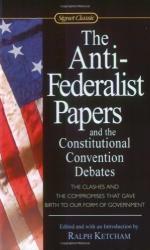
|
| Name: _________________________ | Period: ___________________ |
This test consists of 15 multiple choice questions and 5 short answer questions.
Multiple Choice Questions
1. What did the Virginia Plan propose to do to the Articles?
(a) Extend their authority for another ten years.
(b) Ratify them in Virginia.
(c) Discard them.
(d) Fix their flaws.
2. What were Americans and Britons discussing a great deal during the 1770s?
(a) Warfare against the Native Americans.
(b) Warfare against the French.
(c) Political thought and theory.
(d) The Massachusetts charter.
3. What did Alexander Hamilton want to protect the executive from?
(a) Foreign influence.
(b) Popular sentiment.
(c) Assassination.
(d) Corruption.
4. What was the objection to constitutional monarchy at the constitutional convention?
(a) The possibility of a runaway executive.
(b) The threat of tyranny of the masses.
(c) The Americans' distaste following the war.
(d) The threat of mob rule.
5. What did the delegates argue concerning the question of whether the judiciary should be able to veto legislation?
(a) That the executive would be rendered powerless.
(b) That the judiciary would become the most powerful branch of government.
(c) That the executive would thereby attain control over the legislature through the judiciary.
(d) That the judiciary would thereby acquire legislative power.
6. What did Dr. Johnson advocate during the debate over federal power?
(a) Centralizing power in the federal government.
(b) Preserving state power.
(c) Reducing the size of the federal government.
(d) Instituting a Supreme Court.
7. Which form of government includes direct voting by the people?
(a) Constitutional monarchy.
(b) Representative democracy.
(c) Republic.
(d) Oligarchy.
8. What did all the delegates at the federal convention agree on?
(a) Laissez-faire economic policy.
(b) Government by consent.
(c) The importance of a strong central government.
(d) The rights of a king.
9. What did Madison argue for in his letter to George Washington?
(a) The supremacy of national laws over states' laws.
(b) Independence of states to coin money.
(c) Restraints against a supreme national legislature.
(d) Independence of states to make laws.
10. What were opponents of the resolution that was ultimately adopted afraid of?
(a) That the federal government would become too powerful.
(b) That trade would be stifled.
(c) That the states would gain too much independence.
(d) That foreign countries would be able to divide and conquer.
11. What was cut out when the Constitutional Convention doted down part of the Virginia Plan?
(a) Congress's ability to declare war.
(b) Congress's ability to impose state taxes.
(c) Congress's ability to vote down state laws.
(d) Congress's ability to regulate interstate trade.
12. What did James Madison argue during the argument over representation by person or by state?
(a) Popular sovereignty argued for representation by person.
(b) Fairness argued for representation by state.
(c) The populace would not be served by state representatives.
(d) The ruling classes would benefit by representation by state.
13. What did the New Jersey Plan allow the federal government to do?
(a) Tax intra-state commerce.
(b) Support a Supreme Court.
(c) Maintain a standing army.
(d) Regulate slavery.
14. What kind of representation did James Madison advocate?
(a) Representation by person.
(b) Representation by revenue.
(c) Representation by state size.
(d) Representation by state.
15. What was the dominant fear about the executive?
(a) The power to impose taxes.
(b) The power to go to war.
(c) The power to appoint judges.
(d) The power to regulate trade.
Short Answer Questions
1. What was Mr. Wilson's feeling about the compromise?
2. What did opponents of the resolution that was ultimately adopted think would be the consequence of adopting the proposal?
3. What resolution was ultimately adopted?
4. What did the delegates argue concerning the question of whether the judiciary should be associated with the executive?
5. What subject were the delegates debating in Chapter 6?
|
This section contains 721 words (approx. 3 pages at 300 words per page) |

|




